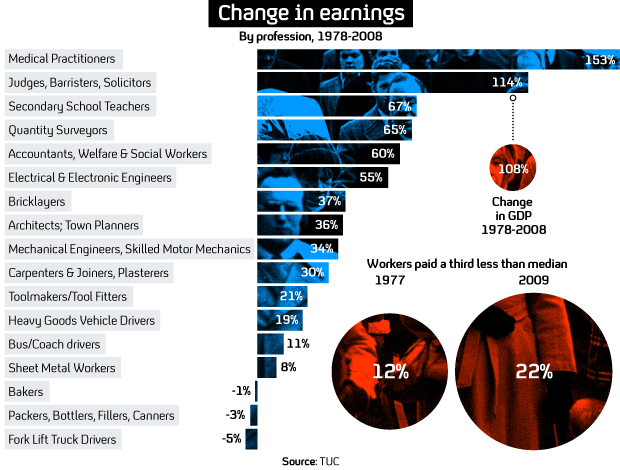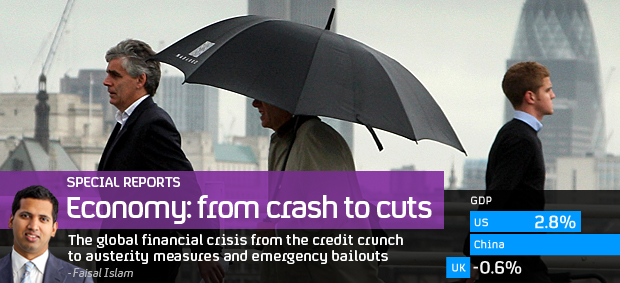Wages at standstill over last 30 years
Many low and median earners have seen no real improvements in their incomes over the last 30 years despite economic growth, a TUC report shows. Channel 4 News maps the winners and losers.

Low and median incomes increased by only 27 per cent and 56 per cent respectively in the three decades leading up to the recession, despite the economic boom.
The TUC’s Britain’s Livelihood Crisis report said that the figures showed a “livelihood crisis” has been brewing in Britain for decades, and was only put off by an “unsustainable rise in personal debt”.
The report shows that wages have been falling sharply as a share of the national wealth since the 1970s – but it also suggests there is a huge difference between professions.
Higher earners, including barristers and medical practitioners, have seen huge rises in their income, while those in professions like bakers and truck drivers have seen their earnings actually fall in the last 30 years.
Gap widening between high and low earners
The real wages (adjusted for inflation) show that medical practitioners have seen their wages leap by 153 per cent, while bakers’ pay fell by 1 per cent. Judges, barristers and solicitors earn 114 per cent more than they did in the 70s – but forklift truck drivers earn 5 per cent less in real terms.
People often cite the recession as the source of this income squeeze. but a livelihood crisis has been brewing in Britain for decades. TUC General Secretary Brendan Barber
The top 10 per cent of earners are the only group whose income has risen in line with GDP since 1978. Their pay has risen twice as fast as those on median incomes, and four times faster than the lowest 10 per cent of earners.
The report, authored by Stewart Lansley, also says there has been an increase in “bad jobs”, which offer poor wages and job security. The proportion of workers whose wages are at least a third less than the median (£11.09 an hour) has doubled in the last three decades from 12 per cent in 1977 to 22 per cent in 2009.
Livelihood crisis
The recession will only make things worse, the TUC argues.
TUC General Secretary Brendan Barber said: “Britain has got much wealthier over the last three decades. But while a small financial elite have grabbed an ever larger share for themselves, many people on low and middle incomes have seen barely any improvement in their incomes, while some have even seen their take home pay fall.
“People often cite the recession as the source of this income squeeze, but a livelihood crisis has been brewing in Britain for decades…Unless we radically transform our economy – from recasting the role of the state to prioritising a fairer distribution of new wealth and jobs – we will simply be storing up more problems for the future.”
